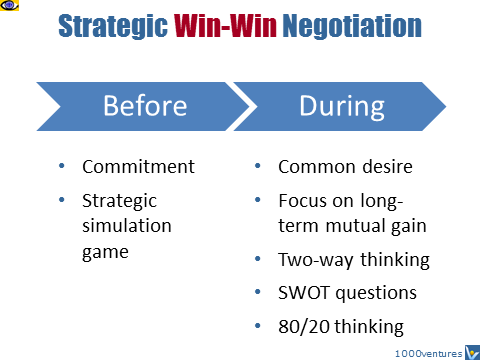|
Negotiation
Rainbow
Negotiation Tips by
 Vadim Kotelnikov
Vadim Kotelnikov
 |
Start
Win-Win negotiation
with defining a
shared vision of a desired future you want to
achieve.
→
Wise
Agreement
See yourselves not as
bargainers, but as
creators and
strategic design thinkers
who design a better future jointly.
Treat the negotiation process as a partner dance where the
Lead-Follow roles are switched frequently and willingly to
arrive at a Win-Win solution in a
 harmonious way.
>>> harmonious way.
>>>
While being
strategically focused on the desired outcome, be
tactically
flexible, like river water, in your approaches to
selecting or inventing the routes towards the desired results.
→
Negotiation
DOs and DON'Ts |
 |
Would you
persuade,
speak of interest, not of reason. |
Benjamin Franklin |
 |
Be persistent.
Don't expect to "win"
the first time. Your first job is just to start
the other person thinking. |
Benjamin Franklin |
| |
|
American Top Negotiation
Technique
A
typical technique of U.S.
diplomacy: first, harsh
statements are made, then a
negotiator comes on stage to
soften the response and change
the direction of the dialogue.
|
|
|
|
Negotiating Agreement Without Giving In |
Negotiating
Principles |
|
Separate the
Relationship with the People from the Substance of the Deal
Be hard on the deal, soft on the people
See the deal from inside their shoes
Make your proposal consistent with their value
Focus on Shared Values and
Interests, but not on the Positions Each Side Takes
Values define the deal
Each side has multiple interests
– be clear on
yours, discover theirs
In Stuck,
Brainstorm
Options for Mutual Benefit
Be creative,
think outside the box
Identify shared interest
Use Objective Criteria for
Decision-Making
Strike a deal based on principle, not pressure
Agree on fair standards and procedures
Frame issues as a collaborative quest
|
-
Set the tone early, offset any bad rumors, be candid.
-
Utilize "human factors" and be open about feelings and motives: this
will enhance trust.
-
Avoid presenting too many issues, highlight the strongest ones.
-
Avoid deadlines, lessening the chance for needless concessions.
-
Summarize frequently: this enhances understanding.
-
Present arguments calmly, without personalization, and make sure they
are logically supported.
-
Avoid use of personal opinions in arguments.
-
Avoid ultimatums and other forms of non-negotiable demands.
-
Admit, when appropriate, the validity of the other party's arguments.
|
|
Apply
80/20 Principle
According to
80/20 Principle,
20% or fewer of the points at issue will comprise over 80% of the value of the
disputed territory; 80% of the concessions will occur in the last 20% of time
available.
Tips for Global Business Travelers
Expect your
meetings and
negotiations to be longer
than anticipated. Build more time into schedules.
|
"Trust only those who stand to lose as much as you
when
things go wrong."
~ Bralek's Rule for Success
Pretending Ignorance: Smart Is Dumb
Socrates
used this technique more than 2300 years ago. He pretended ignorance in order to encourage others to express
their views fully.
Today, many world's smartest and fastest businesspeople have perfected this art
– consciously or unconsciously – of paying dumb. "People who try to impress by
pretending to be smart generally aren't. Truly smart people know that by playing
dumb and asking the other party to repeat or explain things several times,
asking
lots of questions, they'll be better prepared to respond and then make a
fast decision."
|
 Humorous Negotiation Tips
Humorous Negotiation Tips
|
Negotiating Tips from the
Murphy's Law Complete
Eddie's First Law of Business:
Never conduct negotiations before 10
a.m. or after 4 p.m. Before 10 you appear too anxious, and after 4 they think
you're desperate.
Truman's Law:
If you cannot convince them, confuse
them
Helga's Rule:
Say no, then negotiate.
|
 |
A little sincerity is a dangerous thing,
and a great deal of it is absolutely fatal.
>>> |
Oscar
Wilde |
 |
I like to do all the talking myself. It
saves time, and prevents arguments.
>>> |
Oscar
Wilde |
 |
If a person knows what he wants, he
either knows too much or wants too little.
>>> |
Mikhail
Zhvanetsky |
|
|